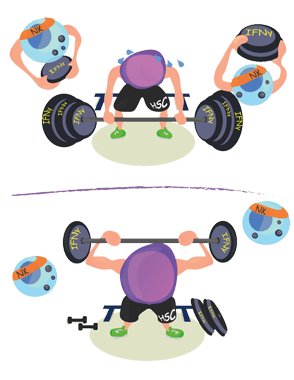An international research team led by Meritxell Alberich-Jorda (IMG) published a study in the Stem Cell Reports journal that identifies cells and molecules present in the donor’s blood as key elements controlling hematopoietic stem cell activity in bone marrow transplantation.
The success of a bone marrow transplant depends on the optimal condition of the donor hematopoietic stem cells that are administered to the patient. Researchers have recently discovered that cells that have previously been considered harmless can reduce the success of transplantation. An international research team led by Meritxell Alberich-Jorda (IMG) published a study in the Stem Cell Reports journal that identifies cells and molecules present in the donor’s blood as key elements controlling hematopoietic stem cell activity in bone marrow transplantation.

Picture: Activated natural killer (NK) cells produce large amounts of interferon gamma (IFNg), a molecule that can affect hematopoietic stem cell (HSC) function. Therapeutic approaches to reduce the effect of INFg could be helpful in transplants where the number of stem cells is limited.
Author: Maria Kuzmina, Institute of Molecular Genetics of the Czech Academy of Sciences
Lobo de Figueiredo-Pontes L, Adamcova MK, Grusanovic S, Kuzmina M, Aparecida Lopes I, Fernandes de Oliveira Costa A, Zhang H, Strnad H, Lee S, Moudra A, Jonasova AT, Zidka M, Welner RS, Tenen DG, Alberich-Jorda M: Improved hematopoietic stem cell transplantation upon inhibition of natural killer cell-derived interferon-gamma. Stem Cell Reports 2021. [pubmed] [doi]
Miroslava Kari Adamcová, Ph.D.,
phone: (+420 )296 442 463, e-mail: miroslava.adamcova@img.cas.cz,
web: www.img.cas.cz/research/meritxell-alberich-jorda
Martin Jakubec, Ph.D.,
phone: (+420) 296 443 159, e-mail: m.jakubec@img.cas.cz
Full press release as PDF (in Czech).